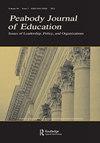School Library Research: Guest Editors’ Introduction
Q2 Social Sciences
引用次数: 0
Abstract
This section of the Peabody Journal of Education is dedicated to the services and strategic leadership that today’s school librarians provide to shape the future of education. School libraries and librarians occupy a unique position in K–12 education as both resource and agents for student success. As education has evolved, school libraries have transformed from quiet spaces lined with books into hubs of research, creation, and reading in all its many formats. Libraries are a center of the school community, a place for students and staff to advance student achievement through critical inquiry, evaluating and using resources to construct new meaning. Libraries play a critical role in creating lifelong learners. School librarians are committed to providing equitable access for all students so they can pursue interests of academic and personal relevance. School libraries offer a wide array of up-to-date and diverse resources from which librarians provide expert instruction on information literacy and digital learning that prepare students for college, career, and life. School leaders can empower their entire school community by leveraging the expertise of their school librarian and the school library’s print and digital tools and technologies to ensure that students have a more equitable and successful educational experience. Viewed through a lens of economic efficiency, school libraries are a high-value investment in student success. Shattering the shushing stereotype of the past, school librarians have transformed into leaders in literacy, digital citizenship, and information management and serve as partners in instructional technology. Effective school libraries are not possible without leadership that recognizes that qualified school librarians are instructional leaders and teachers who serve across all grade levels and content areas. Librarians collaborate with teachers, pivot to new methods of instruction, broaden opportunities for reading material that address students’ social and emotional well-being, and leverage community partners to create dynamic learning experiences that support the ever-changing needs of students. A school librarian, serving as a teacher, leader, instructional partner, information specialist, and program administrator, has the ability to impact students throughout their years in school. School libraries bridge the gap between access and opportunity, providing students a safe space to explore personal interests and issues. Yet the library world is not immune to the unique challenges faced by educational leaders and institutions across the nation today. These challenges present barriers to the very foundation of public education: equitable access and intellectual freedom. The research presented here explores the DNA of effective school libraries and current threats that endanger their existence and impact the success of all learners. Our researchers examine barriers to access created by socioeconomic status, geographical opportunity, a racial reckoning, and a global pandemic. They evaluate the components of quality preservice library science programs and explore the role professional associations like the American Library Association and American Association School Librarians and state library chapters play in supporting educational leadership. And, in a time of a nationwide literacy crisis, an epidemic of information illiteracy (i.e., “fake news”), and the demand for supporting students in hybrid and blended learning, why have we seen a 20 percent decline in the number of school librarian jobs over the past 10 years?学校图书馆研究:客座编辑介绍
《皮博迪教育杂志》的这一部分致力于当今学校图书馆员为塑造教育的未来所提供的服务和战略领导力。学校图书馆和图书馆员作为学生成功的资源和推动者,在K-12教育中占据着独特的地位。随着教育的发展,学校图书馆已经从书籍林立的安静空间转变为各种形式的研究、创作和阅读中心。图书馆是学校社区的中心,是学生和教职员工通过批判性探究、评估和利用资源构建新意义来提高学生成绩的地方。图书馆在培养终身学习者方面发挥着至关重要的作用。学校图书馆员致力于为所有学生提供公平的访问机会,以便他们能够追求与学术和个人相关的兴趣。学校图书馆提供了广泛的最新和多样化的资源,图书馆员从中提供信息素养和数字学习的专家指导,为学生的大学、职业和生活做好准备。学校领导可以利用学校图书馆员的专业知识以及学校图书馆的印刷和数字工具和技术,增强整个学校社区的能力,以确保学生获得更公平和成功的教育体验。从经济效率的角度来看,学校图书馆是学生成功的高价值投资。打破了过去令人震惊的刻板印象,学校图书馆员已转变为识字、数字公民和信息管理领域的领导者,并成为教学技术领域的合作伙伴。如果没有领导层认识到合格的学校图书馆员是教学领导者和教师,他们服务于所有年级和内容领域,那么有效的学校图书馆是不可能的。图书馆员与教师合作,转向新的教学方法,扩大阅读材料的机会,以满足学生的社会和情感健康,并利用社区合作伙伴创造动态的学习体验,支持学生不断变化的需求。学校图书管理员,作为教师、领导者、教学伙伴、信息专家和项目管理员,有能力在学生在校期间影响他们。学校图书馆弥合了访问和机会之间的差距,为学生提供了一个探索个人兴趣和问题的安全空间。然而,图书馆界也不能免受当今全国各地教育领袖和机构所面临的独特挑战的影响。这些挑战阻碍了公共教育的基础:公平入学和知识自由。这里介绍的研究探索了有效的学校图书馆的DNA,以及目前危及其存在并影响所有学习者成功的威胁。我们的研究人员研究了社会经济地位、地理机会、种族清算和全球疫情造成的获取障碍。他们评估了优质职前图书馆学项目的组成部分,并探讨了美国图书馆协会、美国学校图书馆员协会和州立图书馆分会等专业协会在支持教育领导力方面所发挥的作用。而且,在全国范围内的扫盲危机、信息文盲(即“假新闻”)的流行以及支持学生进行混合和混合学习的需求的时代,为什么我们看到学校图书馆员的工作数量在过去10年中下降了20%?
本文章由计算机程序翻译,如有差异,请以英文原文为准。
求助全文
约1分钟内获得全文
求助全文
来源期刊

Peabody Journal of Education
Social Sciences-Education
CiteScore
2.20
自引率
0.00%
发文量
43
期刊介绍:
Peabody Journal of Education (PJE) publishes quarterly symposia in the broad area of education, including but not limited to topics related to formal institutions serving students in early childhood, pre-school, primary, elementary, intermediate, secondary, post-secondary, and tertiary education. The scope of the journal includes special kinds of educational institutions, such as those providing vocational training or the schooling for students with disabilities. PJE also welcomes manuscript submissions that concentrate on informal education dynamics, those outside the immediate framework of institutions, and education matters that are important to nations outside the United States.
 求助内容:
求助内容: 应助结果提醒方式:
应助结果提醒方式:


